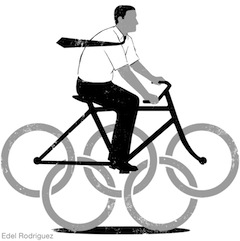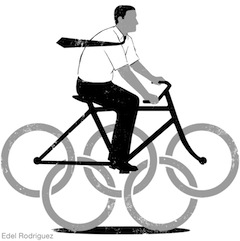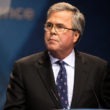 The 2002 Salt Lake City Olympics were the beginning of Mitt Romney’s second act in politics, a fresh audition before the public after losing a Senate race to Ted Kennedy in 1996. Although the Romneys owned a $5.25 million home in Park City, Utah, it was a temporary move. The day after the closing ceremony, they returned to Belmont, Massachusetts, where 200 supporters were waiting at their home, urging Mitt to stay in public life.
The 2002 Salt Lake City Olympics were the beginning of Mitt Romney’s second act in politics, a fresh audition before the public after losing a Senate race to Ted Kennedy in 1996. Although the Romneys owned a $5.25 million home in Park City, Utah, it was a temporary move. The day after the closing ceremony, they returned to Belmont, Massachusetts, where 200 supporters were waiting at their home, urging Mitt to stay in public life.
Eric Fehrnstrom, the former Boston Herald reporter who has worked for Romney since he was governor of Massachusetts, used one trope when talking to the media: “Mitt Romney…rescued the Olympics and restored pride in the United States at a critical time in our history.”
Fehrnstrom has even claimed that rescuing the Olympics provided Romney with experience that Barack Obama lacks. “He organized and ran the Winter Olympic Games in 2002,” Fehrnstrom said in June on ABC’s This Week. “He’s run a state successfully. I think that’s a big difference between these two.”
The campaign narrative has Romney saving an Olympics abandoned by sponsors after executives on the Salt Lake Organizing Committee (SLOC) were caught bribing members of the International Olympic Committee.
“The best way I can describe what [Romney] faced,” one of his corporate colleagues from Boston told the Boston Globe in 2007, “is trying to rebuild an airplane while it is still flying.”
Romney was a competent manager of the Olympics, which was an enormous undertaking. But there were problems—some created by Romney himself.
To make himself look like the “white knight,” Romney invested a lot of effort in vilifying his predecessors, in particular previous SLOC president Tom Welch, who was damaged goods before Romney was hired. Romney even intervened in the criminal case against Welch, who was indicted in 2000. Romney turned to Washington for funding, leaving taxpayers to provide $1.5 billion in support for the Games. And he tried to wriggle out of an agreement to repay money that local governments loaned the SLOC.
“If you haven’t been here, I can assure you the mountains were here before Mitt came,” says Kenneth Bullock. “We had an airport. We had infrastructure.”
Bullock is one of several Utahans I interviewed, some off and some on the record, regarding Romney’s work as CEO of the SLOC.
Bullock had a front-row seat on the SLOC: He represented the Utah League of Cities and Towns, watching $59 million that cities had loaned the committee to build Olympic facilities. Not just the mountains and airport, Bullock said, but also a contract with the International Olympic Committee, sponsors, broadcast contracts, and substantial revenue were all locked in before Romney was hired to “rescue” the Games from a scandal that was reputational and not financial.
Romney was hired more than three years before the Games began, Bullock says, and he contrived a financial crisis “so he could be perceived as the hero he portrays himself to be.”
That “financial crisis” Romney fixed was impossible to follow because he immediately shut state and local government out of the budget process, says Sydney Fonnesbeck, a Salt Lake Council member who had been involved in Utah’s Olympic campaign for 10 years.
“There were no more budget committee meetings,” Fonnesbeck says.
“Closed. It couldn’t have been more closed,” Bullock says of the budget process under Romney.
Yet there was enough information about the process before Romney moved it behind closed doors to belie his claim that the Games were on the brink.
“I could show you where even at that point we still maintained all the major sponsors. [The financial crisis] was a crisis Mitt created. He was painting a picture of something that wasn’t there, and soon it became all about him. And he became this white knight.”
As Bullock—and two other sources who spoke off the record—made clear, the white knight created a bête noire along with the financial crisis.
“Romney had to tear Tom Welch down so he could make himself look good,” Bullock said. “There would have been no Games without Tom Welch; he had worked on them for years.”
Welch was one of two SLOC executives indicted for financial irregularities related to lavish gifts, college scholarships, jobs, travel, and lodging, all provided to International Olympic Committee members and their families in a (successful) attempt to bring the Games to Utah. Welch resigned his position as CEO after pleading no contest to assault charges his now ex-wife filed against him while he was traveling in Africa with their sons.
Romney became a relentless public critic of Tom Welch, writing him off as guilty of the federal charges and attacking him in the media.
Romney had been a dinner guest at Welch’s house before the scandal broke, and before taking the SLOC job. But once he went to work in Utah, he went to work on Welch. Romney tried to deny Welch and his SLOC colleague and codefendant David Johnson access to SLOC insurance that would cover their legal expenses. He even attempted to push Welch into a guilty plea, as Welch and Johnson awaited trial on federal charges related to the $1 million they had spent cultivating support for the Games.
In a telephone interview, Fonnesbeck told me that about six months before Welch’s case went to trial in June 2001, she got a call at her office. “When they said it was Mitt Romney, I thought it was a joke,” she says.
The call was no joke. Romney had discovered she was close to Welch and wanted her to persuade him to plead guilty.
“He told me it was best for the Olympics and best for Utah to get this scandal behind us,” Fonnesbeck says. “I said that he must have no idea how much it means to Tom to go to court and clear his name.”
When Fonnesbeck made it evident that the civic-duty argument was going nowhere, Romney tried another approach. “He said, ‘Tom might think he’s got a good case, but if he’s convicted they could send him to jail for a long time.’”
Fonnesbeck was stunned, she says. The CEO of the Salt Lake Games, whom she had briefly met while conducting business for the League of Cities and Towns (where she also worked), was leaning on her to influence a criminal case that involved her friend and colleague.
Fonnesbeck says it was possible that she would be called as a witness in Welch’s trial, as she had provided material to his attorney.
The case against Welch and Johnson collapsed when an SLOC board member testified that he and his colleagues were aware of the money spent on International Olympic Committee members and their families, an admission that undermined the prosecution’s claim that the men had deceived their board. Press accounts citing the trial transcript included Judge David Sam’s comments to the two defendants at the close of the trial.
“I can only imagine the heartache, the disappointment, the sorrow that you and your loved ones suffered through,” Sam said. “My hope is that you will now be appropriately recognized and honored for your efforts.”
Yet Romney refused to let up, insisting that the prosecutors had botched the case against Welch. (Romney has a law degree, but has never practiced.)
“Mitt Romney, as far as I know, was never in the courtroom, didn’t see any of the evidence, and never asked the prosecutors for a summary of the case,” the lead prosecutor, Richard Wiedis, told the Globe.
Romney even insisted that Welch’s name be removed from all Olympic publications and excluded from a plaque in an Olympic plaza.
If he couldn’t put the guy behind bars, Romney ensured that Welch remains airbrushed out of the history of the Games on which he worked for more than 10 years before Romney took charge.
Romney also so thoroughly embraced the Church of Jesus Christ of Latter-day Saints throughout the planning process that the Salt Lake Games came to be called “the Mormon Olympics.”
While it would be impossible to hold any public event in Salt Lake without involving the region’s dominant institution, Romney, who had served as the head of a Mormon stake and as a bishop in Massachusetts, arrived in Utah as if he were fulfilling a Joseph Smith prophesy.
If he wasn’t anointed by the Angel Moroni, Romney’s appointment was a deal done by a small circle of prominent members of the Mormon church.
Consider.
Ken Garff, a former speaker of the Utah House and a Mormon, was the chairman of the Olympic committee. Kem Gardner, the Salt Lake go-between who promoted Romney’s candidacy, had done his mission years in Boston, where he met Romney. The SLOC’s interfaith director was the son-in-law of the church’s national president, Gordon B. Hinckley, who on occasion played host to International Olympic Committee delegations. The church had sent delegations to site selection meetings in Europe.
Romney appointed Fraser Bullock, a Mormon colleague from Bain Capital in Boston, as the COO for the Games. Bullock, who now runs a private equity firm in Salt Lake, argued that a larger power than the LDS Church was behind Romney. “During the Games, I’m certain we had a divine hand with us,” he said in a 2002 speech at Brigham Young University.
Romney also bucked public opinion and the opposition of at least one of his board members when he quietly accepted an offer from the church to “lend” the Olympic committee a parking lot adjacent to Temple Square to be used as a medals plaza, ensuring that the Temple would be the backdrop to medal ceremonies.
In cutting a deal with the church, Romney foreclosed another proposal to locate the medals plaza on property near City Hall, which could have been turned into a permanent Olympic plaza after the Games. The Tabernacle Medals Plaza was returned to its previous use as a parking lot, after the Games ended. Salt Lake’s permanent Olympics monument ended up in front of a Barnes & Noble bookstore in Gateway Mall, which was then owned by Romney promoter Kem Gardner.
Romney’s announcement that no alcohol could be consumed near the medals plaza was more than even sober Salt Lake could swallow. Jon Huntsman Sr., one of the Utah’s most prominent and wealthy Mormons, became one of Romney’s most vocal critics.
“We’ve got a chairman who is active LDS. Now we’ve got a present CEO who is active LDS,” Huntsman told the Salt Lake Tribune. “They claim they’re going out and really scouring the world to find the best person, so Mitt brings in one of his cronies to be the COO [chief operating officer]. Another broken promise. Because we’ve got three LDS folks who are all cronies…. Diversity in the Olympics is what it’s all about. These are not the Mormon Games.”
Romney relented on the alcohol ban, inviting reporters to join him for a champagne toast, although in observance of his faith’s proscription of alcohol, he raised a flute of orange juice.
He did sign off on an SLOC Mormon pin depicting two young men on bicycles and in black slacks and white shirts, with thin black ties trailing behind them in the wind as they pedaled forward. Committee executives insisted that they were not “Mormon” pins, because everybody rides bicycles in Utah.
“But in black suits and skinny ties?” Salt Lake novelist Karen Brennan asked in a Newsday column.
The church was a generous supporter of the Games, providing money and volunteers. Yet in the end, it was to the state and not the church that Romney turned when he need more money than sponsors and the winners of lucrative contracts could provide.
He relentlessly lobbied the Congress to increase funding to $1.5 billion in federal funds. Romney said the unprecedented costs were driven by security needs after the September 11 attacks—although most of the money was used for public works projects, such as light rail and freeways.
Romney’s attempt to defer the repayment of $59 million to cities put him at odds with Kenneth Bullock.
“He wanted the money as a cushion,” said Bullock, who considered it his responsibility to ensure that the money was repaid on schedule to the local governments who had provided the loan.
When Bullock protested, Romney threatened.
“You don’t want me as an enemy,” Romney warned Bullock in a public exchange.
When Bullock said he was only doing his job, Romney warned him again.
“You don’t want me as an enemy.”
Bullock confronted Romney again, when he asked the SLOC to guarantee a $130 million line of credit from the Bank of America. If the SLOC didn’t sign on, Romney said, the bank might withdraw its line of credit.
Romney was asking Utah’s taxpayers to backstop $130 million in loans while refusing to make the same request of individual concession holders who would earn millions.
“It’s more convenient to go to the tax-payers than to look a corporate executive in the face,” Bullock said.
In the end, the 2002 Winter Games weren’t the Mormon Olympics—they were the Romney Olympics.
They provided a bridge to the governor’s mansion in Boston and the beginning of a long presidential campaign.
Not only were they underwritten at a dollar level that U.S. cities hosting the Olympics had never come close to, they were the only Games in history that produced official lapel pins honoring the CEO of the local host committee. Not the Mormons on bicycles, but an official Mitt Romney Salt Lake Olympics Pin.
Actually, several, with two bearing the image of the ruggedly handsome Mormon CEO.
Because money is fungible, the Romney pins were paid for by the American taxpayer.
They were made in China.
Also in this issue: Cashing In on the Olympics and Zinc Into Gold







0 Comments